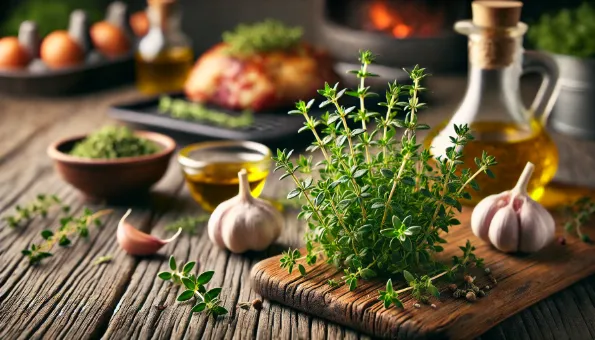Thyme: Fragrant Herb for Roasts, Soups & Marinades
A Mediterranean herb in the mint family with citrusy, earthy notes; great fresh or dried and rich in vitamin K.

Introduction
Thyme (*Thymus vulgaris*) is a small-leafed herb in the mint family. Its warm, citrusy, earthy aroma shines in roasts, stews, soups, and marinades. Used both **fresh** and **dried**.
Nutrition (per 1 tsp dried ~1 g)
| Nutrient | Amount |
|---|---|
| Energy | ~3 kcal |
| Carbohydrate | ~0.6 g |
| Fiber | ~0.4 g |
| Protein | ~0.1 g |
| Fat | ~0.1 g |
| Vitamin K | ~17 µg |
| Iron | ~0.5 mg |
Benefits
- Natural **antioxidants** (e.g., thymol, carvacrol)
- **Vitamin K** for normal coagulation
- Flavorful, **low-sodium** way to season food
- Aromatics can help tame strong meaty or fishy notes
Considerations
- Dried thyme can turn **bitter** if overused
- Possible **allergy** or sensitivity for some people
- **Essential oil** is very concentrated—culinary amounts only
Culinary Uses
- Classic in **bouquet garni** and **Herbes de Provence**
- Perfect with **roast chicken**, lamb, mushrooms, tomatoes, beans, and root veg
- Great in **stocks, soups, stews**, and citrus-garlic marinades
- **Conversion:** 1 tsp dried ≈ **1 Tbsp fresh**
Tips
- Add **dried** thyme early; add **fresh** near the end
- Strip leaves by pinching the stem top and pulling **against** the growth
- Tie sprigs into a bundle for easy removal
Fun Fact
The name comes from the Greek **thýmos**, linked to courage—thyme garlands were worn by warriors.
- 1. Thyme
aromatična mediteranska biljka (začin) iz porodice mente; sitni listići, svježi ili suhi

